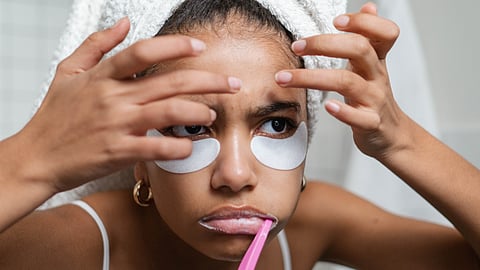

At one point or another, we've all faced the issue of breakouts on our faces. Isn't it upsetting to see those painful and unsightly bumps? Have you ever wondered about their cause? Various factors can lead to acne breakouts, ranging from diet and hormones to lifestyle and genetics. Surprisingly, oral hygiene and even the timing of brushing might affect facial acne. Let's delve into the truth behind this and see what our expert dentist and dermatologist have to say.
As an orthodontist, I have experienced this scenario with one of my colleague's patients who has been suffering from breakouts during her initial appointments for orthodontic treatment. As we are well aware, orthodontic treatment can itself restrain one from proper tooth brushing. This might further increase the microbial load in the oral cavity. Since the mouth is part of our face, there's a possibility of bacteria transferring to the facial skin. So this might have been the cause, but again, we need evidence to prove this. Human skin, the largest organ of the body, is composed of a variety of key microbes associated with skin health, including Staphylococcus, Propionibacterium, Streptococcus, etc. Surprisingly, these bacteria are also associated with oral health and caries. This is just an interconnection that can be drawn but has not been proven scientifically; we further need studies to establish an empirical understanding of this topic.
Why do we brush, and how is it related to acne?
Just like we take a bath daily to keep our body clean, we brush our teeth daily to keep them clean. This is the common strategy. But what does actually brushing do, and what happens if you do not brush? When you don’t brush your teeth regularly, plaque, a thin, sticky biofilm containing bacteria, builds up on your teeth and gums. If left uncleaned, plaque builds up and hardens into calculus, which is even more difficult to clean and becomes a harbor for a huge bacterial load. This can lead to gum infections, which can spread throughout the entire oral cavity, sometimes even extraorally. This gum infection can increase the overall bacterial load in the body, which might cause breakouts. This spread of bacteria can irritate the skin and lead to acne breakouts.
So, most clinicians might suggest that you brush before showering so that any residual bacteria or toothpaste remnants can be washed off during the shower and reduce skin irritation, especially around the lips and chin areas, but this has yet to be proven.
When the content of oral plaque comes into contact with external skin, it may trigger acne due to the oral pathogens.
Dr. Seema Mathew , Oral Maxillofacial surgeon and Cosmetologist at ‘ Dr.Seema's dental and cosmetic centre’, Chennai, India
Toothpaste is a common personal care product used by everyone since childhood. It contains many irritants like fluorides, sodium lauryl sulfate, propylene glycol, and cocamidopropyl betaine as well as flavoring agents like peppermint and cinnamon. A few of the ingredients of toothpaste are known to cause perioral dermatitis, said Dr. Sharon Paulson, Consultant dermatologist at KIMS Health Center and Aeka Holistic Skin Clinic, Trivandrum.
Dr. Sharon further explained that these ingredients are known to cause Perioral dermatitis, characterized by erythematous papules surrounding the mouth along with unilateral and bilateral Burning sensations. These are usually restricted to the area around the mouth and can be differentiated from acne by the fact that they won't leave any scars. This condition will subside once the triggering agent is removed. It is also advised to do the skincare routine after brushing the teeth in order to remove these irritants around the mouth. This condition is challenging, and it is better to opt for non-flavored and non-fluoridated toothpaste if such a condition prevails.
Acne is one of the most common problems faced by many teenagers, and it's something they wish they never had to deal with. Acne can be caused by a variety of factors, including hormonal imbalances, junk food, vitamin deficiencies, oily skin, bacteria, and dirt. 'Hence, it is of utmost importance to clean the face and brush the teeth,' explained Dr. Ketan Vijaysingh Rajput, BDS, MDS, Periodontist and Implantologist, Mumbai, Maharashtra."
Dr. Anela Thomas, an oral pathologist and Scientific Writer at Genomeden, said:
“Correlating brushing habits with acne breakouts is unheard of. From my clinical experience, I've observed hypersensitivity-based skin reactions due to SLS (Sodium Lauryl Sulfate), an active ingredient used in the manufacture of toothpaste and other intraoral hygiene aids.
This ingredient can cause intraoral lesions, and in rare cases, extraoral lesions as well.
These lesions are generally self-limiting and persist only for a short span of time. They can often be mistaken for acne breakouts. Nowadays, there's an increased awareness among dentists about prescribing toothpaste that's free of SLS."
I would recommend a clinical evidence-based study on oral microbiota would be required to link both tooth brushing and acne.
Dr. Anela Thomas, an oral pathologist and Scientific Writer at Genomeden
There's sparse evidence to confirm any interconnection between acne and tooth brushing, but in experts' opinion, the common microbial species can be the connecting lane.
